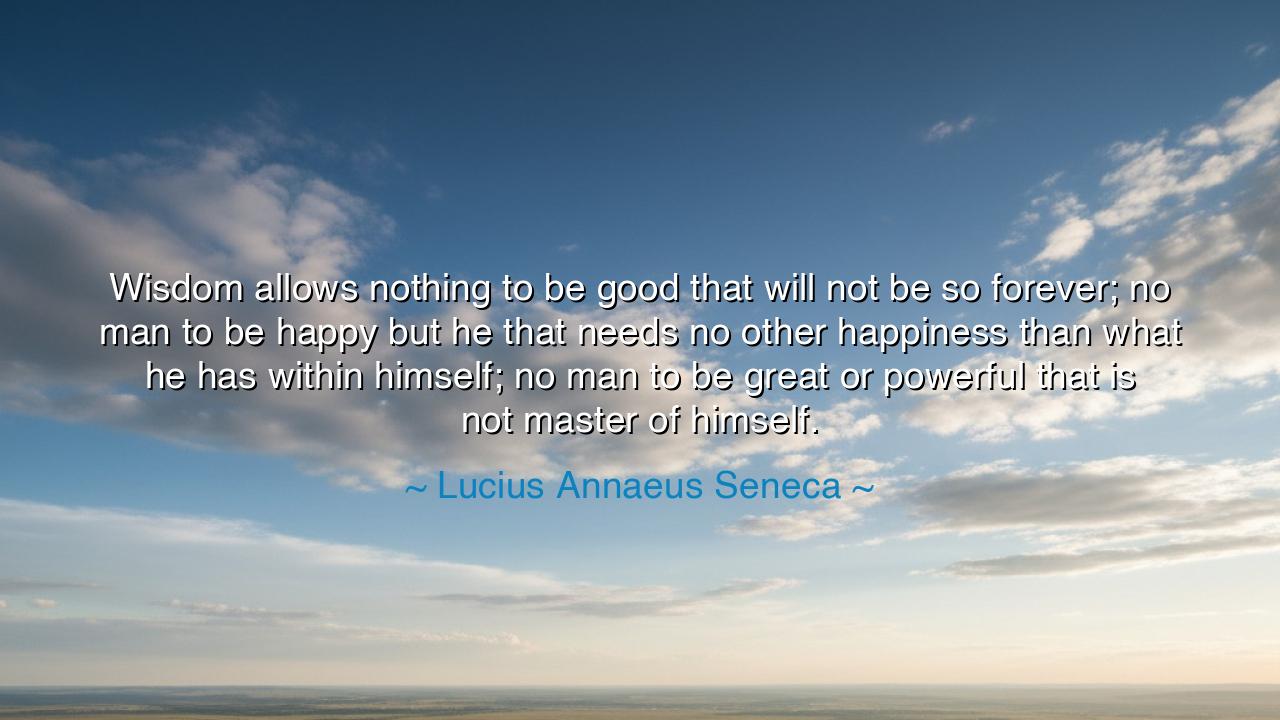
Wisdom allows nothing to be good that will not be so forever; no
Wisdom allows nothing to be good that will not be so forever; no man to be happy but he that needs no other happiness than what he has within himself; no man to be great or powerful that is not master of himself.






“Wisdom allows nothing to be good that will not be so forever; no man to be happy but he that needs no other happiness than what he has within himself; no man to be great or powerful that is not master of himself.” These profound words from Seneca touch upon the very essence of true wisdom, which is not bound by the transient or the fleeting. Wisdom, in its highest form, sees beyond the superficial and embraces what is eternal, what remains steadfast in the face of time’s passing. To be truly good, according to Seneca, is not to seek pleasures that will fade with the seasons, but to embody a goodness that is unshaken, unmoved by external circumstances.
In the ancient world, philosophers such as Socrates and Aristotle held similar views about happiness and virtue. Socrates, perhaps more than anyone, understood that happiness does not depend on wealth, fame, or the approval of others. True happiness, he believed, is found in the cultivation of the soul — in wisdom, virtue, and self-awareness. Seneca echoes this sentiment, telling us that the man who is truly happy is one who requires nothing beyond his own inner peace and understanding. He is not swayed by the ephemeral joys that come and go, but grounded in a happiness that resides within him, untouched by the winds of fortune.
Consider the life of Alexander the Great, who, despite his conquest of vast empires, could never find lasting happiness. Alexander, once a mighty king, found himself constantly yearning for more — more power, more land, more recognition. His external conquests did not bring him the lasting fulfillment he sought, for he was never master of himself. His ambitions were like a burning flame that could never be quenched. In contrast, the stoic philosopher Epictetus, who lived with much less material wealth, understood that true greatness comes not from external achievements, but from mastery over one’s own desires and emotions. Epictetus embodied the wisdom Seneca describes — a greatness born not of the conquest of others, but of the conquest of the self.
Seneca’s teachings remind us that true power is not the ability to command armies or accumulate wealth, but the mastery of our own thoughts and emotions. The man who is ruled by his impulses, by his desires and fears, is not truly powerful. True power comes from the ability to remain calm and resolute, from being the master of one’s own actions and mind. The man who can govern himself, who is undisturbed by external forces, is the one who is truly powerful, for he holds dominion over the only thing he can truly control — his own soul.
Thus, Seneca calls us to look inward for the sources of happiness and greatness. To seek happiness outside of oneself, in fleeting pleasures or external validation, is to live a life of illusion. True contentment comes from the steady foundation of self-mastery, the wisdom to recognize that we already possess all that we need to be truly happy. And true greatness comes not from the accolades of others, but from the quiet strength of self-discipline and inner peace.
In the end, Seneca’s words remind us that the pursuit of external goods and power is fleeting and ultimately unsatisfying. The only true source of happiness and greatness lies within, in the cultivation of wisdom, virtue, and mastery over the self. Wisdom teaches us to seek the eternal, to ground ourselves in what remains unchanged by time or circumstance, and to find our strength in the power we have over our own minds.






VDTran Van Dat
I feel both inspired and intimidated by the idea that true happiness, greatness, and goodness depend on mastery of oneself. It makes me wonder how many of our struggles stem from external dependence rather than internal weakness. Could practices like meditation, self-reflection, or ethical discipline genuinely lead to this ideal state? I’d like to hear examples of people who have achieved remarkable self-mastery and what lessons they offer.
UGUser Google
I’m intrigued by the interplay between wisdom and permanence. Can wisdom really judge what is eternally good, or is everything relative to circumstance and perspective? How do we cultivate insight that sees beyond temporary trends and superficial successes? I’d love to explore how philosophical training or reflection helps individuals recognize what endures versus what fades, especially in modern life full of distractions.
DNDo Ngoc
This passage prompts me to think about the human struggle with dependence. If no one can be happy without self-sufficiency, how do relationships and community fit into this vision of happiness? Is Seneca suggesting that connection is irrelevant, or is he emphasizing the importance of not relying entirely on others for personal fulfillment? I’d like a perspective on balancing internal contentment with external social bonds.
LTTuong Le Truong
I feel challenged by the notion that wisdom rejects anything transient as truly good. Does that mean we should disregard temporary pleasures entirely, or is there a balance between appreciating the fleeting and seeking the eternal? How do we differentiate between what is temporarily satisfying and what aligns with lasting virtue or happiness? This raises deep questions about how to prioritize our actions and values.
NNHai Ninh Nguyen
I find myself questioning the relationship between power and self-control. If greatness or authority depends on mastery of oneself, how many historical leaders failed because they lacked it? Could it be that true influence comes less from external achievements and more from internal discipline? I’d like to explore practical ways to train self-mastery in daily life, especially when faced with temptation or stress.